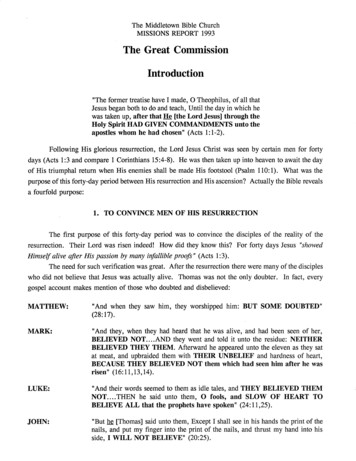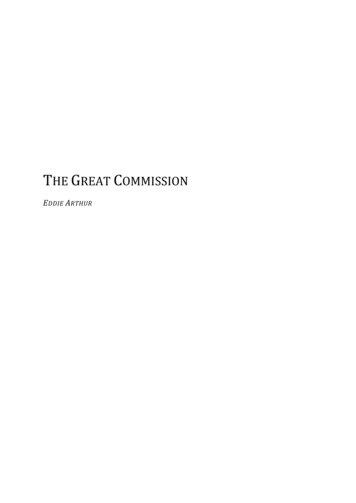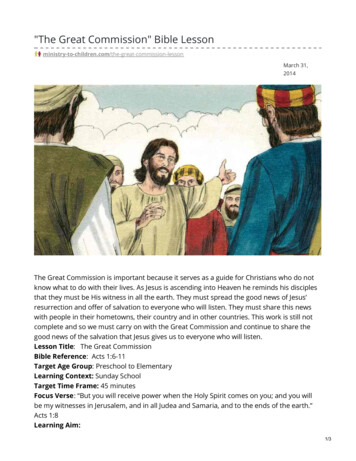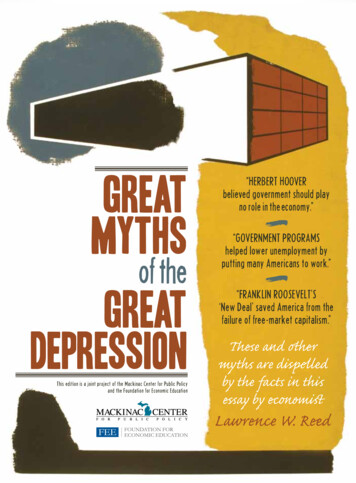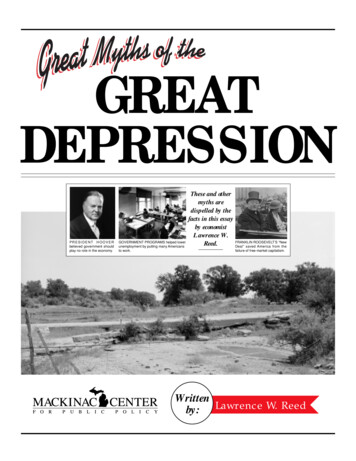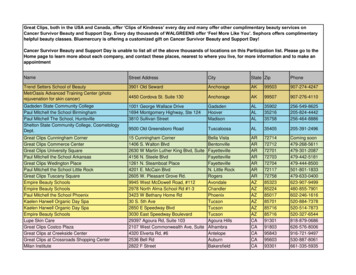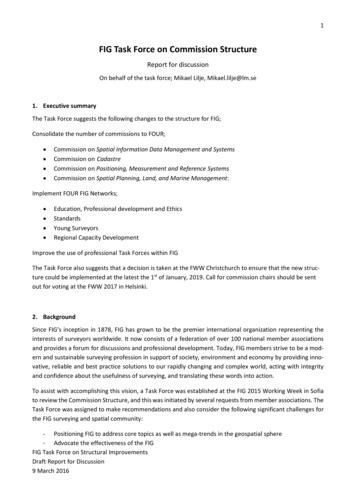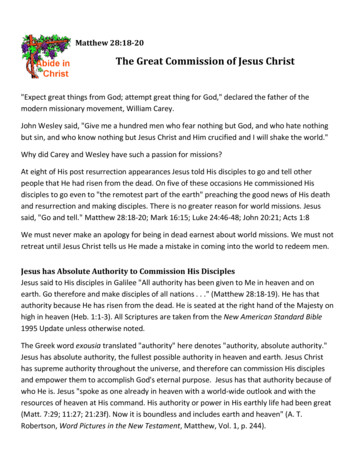
Transcription
THE GREAT CoMMISSION AND THE MINISTRYOF THE WORD: REFLECTIONS HISTORICAL ANDCONTEMPORARY ON RELATIONS AND PRIORITIES(FINLAYSON MEMORIAL LECTURE,DAVIDF.2007)WRIGHT, UNIVERSITY OF EDINBURGHThe last three verses of Matthew's Gospel have enjoyed an honouredplace in the era of Protestant missions from the time of William Careyat the turn of the eighteenth and nineteenth centuries. Today they arecommonly known as 'the Great Commission'. When they were first sodescribed and, more significantly, when that designation became standardusage are questions which cannot yet be answered with any confidence.Occasionally writers have supplied over-confident answers to the secondquestion, but for the present, pending more exhaustive research, a provisional judgement must suffice: it was not until the last decades of thenineteenth century, or even perhaps the earliest years of the twentieth,that Matthew 28:18-20 came to be conventionally referred to as 'the GreatCommission'.'Despite the importance assigned to this short passage during the lasttwo centuries, no extended investigation of the history of its exegesis hasyet been carried out. What makes this all the more remarkable is thewell-known fact that not until the new initiatives ofWilliam Carey's generation was it liberated from seriously restrictive interpretations, whichall in effect denied its applicability as a dominical mandate for universal mission to the Christian church as a whole from the age of the apostles onwards. This much is set forth, sometimes with an exaggeratedThis provisional conclusion has been reached with the assistance ofDr BrianStanley of the Henry Martyn Centre, Westminster College, Cambridge. For adiscussion of the issue, see the Appendix to this article. For premature judgements cf. Rose Dowsett, The Great Commission (London, Grand Rapids,MI, 2001), 19, 'For centuries, the church has known the concluding verses ofMatthew's Gospel as "the Great Commission"'; Abraham Friesen, Erasmus,the Anabaptists, and the Great Commission (Grand Rapids, MI, Cambridge,1998), 137 n. 1, 'The term "Great Commission" was an appellation givento the command of Christ, in Matthew 28:18-20 . by the great missionarymovements of the late eighteenth and early nineteenth centuries.' Modernwriters have frequently applied the phrase to uses made of all or part of theseverses throughout the centuries of the church's history.
THE GREAT COMMISSIONsharpness, in any number of brief surveys. 2 But this widely accepted andoft repeated summary account, with its obvious prima-facie bearing onthe equally remarkable story of the failure of most of the Reformation toespouse the cause of world mission (to speak in general terms, withoutfactoring in various qualifications), has not provoked the kind of rigorous historical enquiry into the reception of these Matthaean verses thatthey deserve. The discipline of the history of biblical interpretation isburgeoning, and there is scope here for more than one viable Ph.D. topic.The subject area should have a natural appeal to the students and scholarsof the evangelical constituency, which among Protestants is increasinglydistinguished by its commitment to a universal gospel mission. Why hasthe Great Commission for most of the church's first two millennia beenanything other than its modern title suggests?THE GREAT COMMISSION·s UNIQUE AUTHORITYFirst, however, it is worth asking whether Matthew 28:18-20 merits itsgrand designation. Jesus himself may have left us a clear identificationof the two 'great commandments' (Mark 12:28-31, Matt. 22:34-40), buton the whole Christians have not gone in for honorific rather than descriptive titles of particular passages of Scripture. Yet good grounds canbe advanced for recognising the uniquely authoritative character of thisinstruction by the risen Jesus to his followers. This does not entail downplaying the significance of other comparable commissioning statementsnear the ends of other Gospels, namely Luke 24:45-50 together with Acts1:4-8, and the more diffused and less clearly worldwide note in John, witha special focus in 20:19-23. 3For a useful iflimited recent account see David Paul Parris, Reading the Biblewith Giants: How 2000 Years of Biblical Interpretation Can Shed New Lighton Old Texts (Milton Keynes, 2006), 121-46. See also the early chapters inGustav Warneck, Outline of a History of Protestant Missions from the Reformation to the Present Time, transl. George Robson (Edinburgh, London,1901), Johannes van den Berg, Constrained by Jesus· Love. An Inquiry intothe Motives of the Missionary Awakening in Great Britain in the Period between 1698 and 1815 (Kampen, 1956), and Harry R. Boer, Pentecost and Missions (London, 1961); David J. Bosch, Witness to the World. The ChristianMission in Theological Perspective (London, 1980), chs 10-14; W. R. Hogg,'The Rise of Protestant Missionary Concern, 1517-1914' in Gerald H. Anderson (ed.), The Theology of the Christian Mission (London, 1961), 95-111.On the range of missiological positions in the New Testament, see JohannesNissen, New Testament Mission: Historical and Hermeneutical Perspectives,3'd edit. (Frankfurt am Main, New York, 2004).133
SCOTTISH BULLETIN OF EVANGELICAL THEOLOGYFor our present exercise any of the endings to Mark's Gospel beyondverse 8 of chapter 16 must be discounted, but in considering the historicalfortunes of the Matthaean Great Commission we must remember that allthe Bibles of the Reformation era made no differentiation between 16:1-8and 16:9-20 (the so-called Longer Ending), and the Authorised (KingJames) Version likewise. The New Testament of the Revised Version,published in 1881, was the first in English to introduce a space betweenverses 8 and 9, with a footnote pointing to the textual evidence for theomission of verses 9-20. 4 Consequently, until the later nineteenth century, Mark 16:15-17 was often conflated with Matthew 28:18-20, sometimesas together constituting the apostles' or the church's mandate for worldmission, or treated as two versions of that mandate. The Marcan passageraised issues not glimpsed by the Matthaean, such as miracles attendantupon conversion, or not posed so sharply by the Matthaean, such as the relation between faith, baptism and salvation. One shrewd Anglican writerclaimed that Mark suited a missionary church better than Matthew, wherebaptism preceded teaching, which must envisage the practice of infantbaptism! He might also have drawn attention to the greater prominencegiven to creation-wide proclamation in Mark 16:15 compared with Matthew 28:19a. 5The long life of the Longer Ending of Mark's Gospel probably helpedto delay the recognition of Matthew 28:18-20 as 'the Great Commission'without parallel. It is the argument of this lecture that it warrants thatsingular designation, for several reasons: its position, at the conclusion of its Gospel, and that regarded as themost Jewish of the Gospels; its context between the resurrection and exaltation of Jesus;The influential text of the Greek New Testament established by Westcott andHort placed the passage in square brackets, and justified this treatment atlength: B. F. Westcott and F. J. A. Hort, The New Testament in the OriginalGreek, 2 vols (Cambridge, London, 1881), vol. 2: Introduction, Appendix,'Appendix', 28-51.Edward Meyrick Goulburn, The Great Commission: Meditations on Homeand Foreign Missions (London, Oxford, Cambridge, 1872), 36: The 'BlessedLord Jesus' had the foresight that the church by the Spirit would rightly interpret his mind about baptizing infants. 'Thou didst, in this great Commission,adjust Thy words exactly to the case of settled Churches, in which Baptismmust always precede "teaching".' Cf. also 3: 'St. Mark's version is morepurely missionary.' Goulburn was Dean of Norwich.134
THE GREAT COMMISSIONoits authority-rich setting, with the core commission of verses 19-20apreceded by 'All authority in heaven and earth has been given to me'(v. 18) and followed by 'Remember, I am with you always, to the endof the age' (v. 20b);oits clarity and directness;oits inclusion of the Trinitarian baptismal formula;oits explicitly dominical status.No attempt is made here to deal with critical issues, for example, aboutthe relation of these verses to the ipsissima verba ofJesus. As a believingChristian and member of the church which has received the Scripturesfrom its Lord, for me they stand in Holy Scripture bearing the authority ofthe risen Jesus Christ. The position assumed by this paper is as follows:The Great Commission is the single most important statement of commissioning of the Christian church, from the risen Christ. In terms of what thechurch should be doing, the New Testament contains no other passage ofcomparable significance.WHAT THE COMMISSION COMMANDSIt remains to spell out what the Great Commission commands, not witha detailed exegesis, but with a view to highlighting its dimensions as awhole and the articulation of its parts. 6 It is issued in the universal authority of Jesus that encompasses heaven as well as earth. The theme of hisuniversal lordship consequent upon the completion of his earthly workis found on a number of occasions elsewhere, for example Acts 2:36, 39and 17:30-31 and Philippians 2:9-ll. His cosmic sovereignty makes theCommission inescapable for his servants, and at the same time renders itsworldwide scope- 'all the nations'- feasible.The central instruction of the Commission is 'Make disciples of allnations', as the sole Greek imperative is now almost always translated(the AV/KJV had 'teach'). All the other verbs, 'going, baptizing, teaching', are participles. Those translations which make 'going' into anIn addition to the commentaries mention may be made of Dowsett, GreatCommission; Karl Barth, 'An Exegetical Study of Matthew 28:16-20', in Anderson (ed.) Theology, 55-71; Bosch, Witness, 66-70; Howard Peskett and Vinoth Ramachandra, The Message of Mission (Leicester, 2003), 172-90.135
SCOTTISH BULLETIN OF EVANGELICAL THEOLOGYimperative, or even connect 'all nations' to it as an indirect object (forexample, the Contemporary English Version, 'Go to the people of all nations and make them my disciples', and similarly the Revised EnglishBible), probably inflate its significance, although experts in the Greek ofthe New Testament seem not to be agreed on the poinC The key elementis making disciples of people throughout the world. What is ordered hereis not universal coverage in some token sense or in presence only or as agoal in itself, but travel with the aim of making disciples. In Matthew ofall the Gospels the Great Commission's fulfilment must entail extensionto the gentile nations. 8The central accentuation of 'make disciples' means that taking theCommission seriously will require investigating what that task involvedin the teaching and activity of Jesus, in Matthew's Gospel in the firstinstance. For the present we note that it will certainly include 'baptizing' and 'teaching', according to the two dependent present participlesin verses 19-20. Both are integrally part of or consequent upon 'makingdisciples'.The specification of baptizing those who have been made disciples orare being made disciples may appear surprising or problematic to manyreaders of this journal, partly because of the low view of baptism prevalent among many evangelicals and partly because infant baptism mayseem not to be accommodated by the implied sequence of baptizing thosewho are already disciples or in the process of becoming disciples. Wemay well feel more at home in 1 Corinthians 1, where Paul says with somerecognisable relief that Christ sent him not to baptize but to proclaim thegospel and almost rejoices in having baptized only a handful of the Corinthian believers (vv. 14-17). The party divisions at Corinth help to explainPaul's comments but do not justify our playing them off against Matthew28:19. There is no evidence that Paul was exempt from any part of theGreat Commission, and implications sometimes drawn from his words to the effect that baptism does not rate very highly in Pauline terms - flyin the face of the rest ofthe New Testament's witness to baptism.So disciples are to be baptized, that is, into the church. There is thusa strongly ecclesial dimension to the making of disciples. Just as being adisciple and being baptized belong inseparably together, so too do beinga disciple and being a living member of the church.Bosch, Witness, 69, citing Adolf Schlatter, suggests the participle is 'in a certain sense pleonastic and could even have been omitted. The crossing ofgeographical frontiers is no key idea here.' This issue will be touched on laterin this paper.Cf. also Matthew 26:13 for the assumption of gospel publication throughoutthe world, but not as a necessary prelude to the end, as in Matthew 24:14.136
THE GREAT COMMISSIONIn addition to baptizing in the name of the Trinity, making disciplesalso involves teaching issuing in obedience: 'teaching them to obey everything that I have commanded you', says Jesus. This seems to envisage aspecial place for the teaching of the New Testament Gospels in the worldwide Christian mission. It might appear outrageous to think otherwise,but some of us have by habit and perhaps conviction been more oftenPaul people than Gospel people, or at least more Johannine than Synoptic(Matthew, Mark and Luke) people. Whatever curriculum or scheme isfollowed in planning instruction or preaching, the four Gospels must havea central place.The sequence, then, is making disciples, to be pursued in all nations,which encompasses or leads on to baptizing and teaching. Questions oftiming inevitably arise. Baptism is momentary, as a person moves frombeing unbaptized to being one of the baptized in a few minutes. Teachingmay presumably be lifelong, even if there is a special focus on catechesisaround being discipled and baptized. The aorist imperative translated as'make disciples' is most likely neither as momentary as baptism nor aspotentially long-lasting as teaching.Finally, the whole of the Great Commission is to be carried out in theassurance of the presence of the risen Jesus Christ with the apostles andthe church until 'the end of the age'. As Karl Barth put it, 'Because ofJesus' presence, the sum and substance of our text, the Great Commissionof the risen Lord to baptize and to evangelise is valid throughout the daysof this "last" age.' 9 Do we need to be recalled to Barth's simple summary? The Great Commission has not been withdrawn or lifted. Its implementation may have been made more difficult by massive geo-politicaland cultural shifts and by the resurgence of other world religions, but itremains in force. The church of Jesus Christ abides under commissionfrom its Lord to make disciples of all nations.David Bosch's summary is worth quoting at length:[I]t remains undeniable that we . have to do with a mandate which, on thebasis of Jesus' authority here and now ('in heaven and on earth', v. 18) isinstructing the disciples that a totally new era has been inaugurated whichimplies their involvement in a world-wide mission .God does not send 'ideas' or 'eternal truths' to the nations. He sends people,historical beings. He incarnates himself in his Son, and through his Son inhis disciples. God becomes history, specific history, mundane history, in thefollowers of Jesus en route to the world. 1010Barth, 'Exegetical Study', 71.Bosch, Witness, 68, 70. Cf. Harry R. Boer, Pentecost and Missions (London,1961), 122.137
SCOTTISH BULLETIN OF EVANGELICAL THEOLOGYNEGLECT OF THE COMMISSION: FATHERS AND REFORMERSIn view of all this, in the light of the supreme significance of what we sofamiliarly call 'the Great Commission', it is astonishing that a respectedmodern book on the subject, Harry R. Boer's Pentecost and Missions(1961), is able to write of 'the apparently complete absence of this motivation [of the Great Commission] as a conscious factor in the missionarylife of the early Church . In the conception of the Reformers and of themajority of seventeenth-century theologians the Great Commission wasbinding only on the apostles . It does not extend to the Church which theapostles founded.' 11 A slight measure of overstatement may be presentin Boer's judgements, but they are sufficiently close to the mark, if suchlimited enquiries as have been conducted so far are reliable, to be trulyshocking. This does not mean that the church of the long pre-Carey centuries did not engage in missionary extension, but our subject is not thegeneral one of missionary motivation but the interpretation of Matthew28:18-20. Certainly when one Adrian Saravia (of whom more later) inthe late sixteenth century published a reading of this passage which thepost-Carey world would instinctively recognise as its own, it was all butunknown to his contemporaries and he met with little but open hostility.The church of the early Fathers was undoubtedly active and remarkably successful in mission and expansion, 12 but the broad picture is ofdisjunction between fruitful activity and halting, incoherent or evenabsent theoryY Some writers like Tertullian, Eusebius of Caesarea (an111213Boer, Pentecost and Missions, 15, 18.See Rodney Stark, The Rise of Christianity (Princeton, NJ, 1996).Parris, Reading the Bible, 122-8, is a useful introduction, but gives onlyselected references. He exaggerates (127-8) the attention paid to Matthew28 by Pope Gregory I, whose commitment to the preaching of the gospel toevery creature favoured Mark 16 with its 'signs following'; one of his FortyHomilies on the Gospels, 11:29, is based on Mark 16:14-20. See further A.V. Seumois, La Papaute et les missions au cours des six premiers siecles(Paris, Louvain, 1951), esp. 84-5, and W. H. Fritze, 'Universa1is gentiumconfessio. Formeln, Trager und Wege universalmissionarischen Denkens im7. Jahrhundert', in Friihmittelalterliche Studien 3 (1969), 98-130, at 108-11.As these studies make clear, Gregory was so instinctively an allegoriser thathe could ground a universal commission on a very wide range of Scripture.Further patristic references can be gathered from Harold Smith, Ante-NiceneExegesis of the Gospels, 6 vols (Translations of Christian Literature ser. 6;London, New York, 1925-1929), vol. 6, 145-55; L. B. Smith, 'The Contribution ofHadrian a Saravia to the Doctrine of the Nature of the Church and itsMission: An Examination of his Doctrine as related to that of his AnglicanContemporaries' (Unpubl. Ph.D. diss., Edinburgh University, 1965), 237-43;138
THE GREAT COMMISSIONimportant witness later for Saravia), John Chrysostom and Gregory theGreat showed greater awareness that Christ in Matthew 28 commissionedhis church to be universally missionary in every age, but no central appeal to the Commission emerges with any clarity from the corpus of themainstream Fathers as a whole. At least, this is the picture so far availablefrom limited scholarly literature. It is perhaps not surprising that somepatristic writers express the conviction that the mandate first delivered tothe apostles had indeed been fulfilled in the apostolic generation. Statements within the New Testament itself may have encouraged this confidence, such as Romans 10:18 ('to the ends of the world') and Colossians1:6 ('all over the world') and 1:23 ('has been proclaimed to every creatureunder heaven'). 14One thing is clear from any foray into patristic citations of these Matthaean verses, as it is later with Reformation writings. Elements in themare cited repeatedly on other issues than the core mandate to make disciples. Among the Fathers, for example, in Athanasius and Basil the Great,it is chiefly Christological and Trinitarian controversies that elicit appealsto one or other verse. The only monograph devoted solely to use madeof them in any period of church history is wholly given to vindicating theTrinitarian text of Matthew 28:19 with reference to texts from Eusebiuswhich appear to count against it. 15The later patristic period in the West witnessed an accelerating tendency to channel the role and authority of the apostles, the original recipients of the Great Commission, into the episcopate and the papacy. In thecentral middle ages this would even give rise to the notion of an 'apostolicchurch' differentiated from the rest of the church. In time these developments would exercise a damaging restrictive influence on interpretationsof the last verses of Matthew.The problematic question of the subdued, if not altogether silent, motifof a mission to all nations among the sixteenth-century Reformers hasattracted frequent comment, for obvious reasons. Yet bewilderment whythose mighty theologians and preachers who took their stand on the supreme authority of Scripture were less than clear-minded about the imperative of world evangelization has not issued in a thesis or monograph1415Adolf Harnack, The Expansion of Christianity in the First Three Centuries,trans. James Moffatt, 2 vols (London, New York, 1904), vol. II, 147-82. Butthe need for a comprehensive research investigation remains.Cf. also Rom. 1: 8; 1 Thess. 1: 8.Bernard Henry Cuneo, The Lord's Command to Baptise. An Historico-Critical Investigation with Special Reference to the Works of Eusebius of Caesarea (Catholic University of America, New Testament Studies V; Washington,DC, 1923).139
SCOTTISH BULLETIN OF EVANGELICAL THEOLOGYon their understanding ofMatthew 28:18-20, nor indeed, to the best of myknowledge, any study of any single Reformer's position. Nor is this theplace to attempt more than some review, mostly in general terms.As earlier, these verses were grist to other Reformation controversies,especially over Christology, chiefly raised by disputes about the presenceof Christ in the Lord's supper, and baptism. Thus all of the referencesto them in the Lutheran Book of Concord, which assembles all the Lutheran confessional texts from the Augsburg Confession of 1530 to theFormula of Concord itself (1580), bear on one or other of these issues.Verse 19a, 'Go therefore and make disciples of all nations', is not citedonce. 16 The Anabaptist challenge to infant baptism brought the baptismal instruction in the Great Commission into play. The difficulty wassharpened by the unquestioned inclusion in all sixteenth-century Biblesof the Longer Ending of Mark with the much more explicit Mark 16:16,'The one who believes [in response to the good news proclaimed in all theworld] and is baptized will be saved; but the one who does not believe willbe condemned.' But the challenge to paedobaptism was clear enough inMatthew 28, which on a natural reading taught that baptism was for thosewho had been made disciples. It has even been argued, quite improbablyon my evaluation of the evidence, that the original inspiration for whatbecame the Anabaptist insistence on baptism for believers only derivedfrom Erasmus's radical reflections on the apparent ineffectiveness of infant baptism, which came to crisp focus in his comments on Matthew28:18-20 and the baptisms in the Acts of the ApostlesY1617Theodore G. Tappert (transl. and ed.), The Book ofConcord. The Confessionsof the Evangelical Lutheran Church (Philadelphia, 1959).This is the core thesis of Abraham Friesen's Erasmus, the Anabaptists, andthe Great Commission (Grand Rapids, MI, Cambridge, 1998). (This book'stitle illustrates the tendency to anachronistic use of 'the Great Commission'identified earlier. Friesen's interest is confined almost entirely to the baptismal limb of the mandate, scarcely touching on Erasmus's concern for worldmission- on which see further below - or the Anabaptists' professed commitment, virtually unparalleled in the Protestant Reformation, to the very heartof the Commission.) A key text for Friesen is what he calls Erasmus's prefaceto the third edition of his Latin New Testament of 1522, following the translation of it given by Robert M. Adams (ed.), Erasmus, Praise ofFolly and OtherWritings (New York, London, 1989), 117-18, 127-41. Adams builds quite acase on this preface's position in the third in the series of editions of Erasmus's new Latin translation of the New Testament, for which he supplied injustification his more celebrated Greek text. Adams claims this preface tookover from the Paraclesis of the earlier editions. He is, however, thoroughlyconfused. The preface in question appears not in any ofErasmus's editionsof the New Testament (in which the Paraclesis remains in place throughout),140
THE GREAT COMMISSIONHence part of these verses and their counterpart in Mark 16 had tobe confronted by mainstream Reformers in the refutation of Anabaptistradicalism. They did so in various ways. Luther characteristically metthe challenge head on. 'Baptizing all the nations' included everybodywithout exception. Infants were not excluded. In any case, if faith were arequisite for baptism, Scripture threw up lots of examples of babies in andout of the womb who displayed the beginnings of faith - infant faith forinfant baptism, as it were.The Reformed wing generally followed the more tempered responseofCalvin, who simply pointed out that the restriction ofbaptism to thosewho became disciples applied only to those capable of becoming disciplesand could not debar young children. The precedent of covenantal circumcision provided sufficient warrant for baptizing the new-born. This lineof reasoning survived with enhanced force into the theological fathers ofthe nineteenth-century Free Church of Scotland like William Cunningham and James Bannerman, as well as into the massive systematics andapologetics of B. B. Warfield. They were all quite convinced that theGreat Commission need only mandate the new, that is, taking the gospelto the gentile peoples and their conversion-baptism. Infant baptism stoodsolely under the continuity of the Abrahamic covenant, and was trulythe Christian form of circumcision. Cunningham and Bannerman couldwrite in so many words of 'adult baptism as affording the proper fundamental type of the ordinance' (Cunningham) and of 'The Bible model ofBaptism [as] adult baptism, and not infant' (Bannerman}. 18 Such treatment of the baptismal clause in the Matthaean Commission must havecontributed significantly to the marginalization of the Commission in thechurches of the old Christendom which in practice knew almost exclusively infant baptism, just as the relish with which the Anabaptists ownedthe Great Commission as a whole goes some way to explaining the centralReformers' apparent reluctance to make much of it.18but as an additional preface in his Paraphrase on St Matthew (1522), afterthe preface proper addressed to Charles V; Erasmus, Opera Omnia, ed. J. LeClerc, lO vols (Leiden, 1703-1706), vol. 7 (1706), ff. **2v-**4v. It is here thatErasmus recommends a ceremony whereby those once infant-baptized wouldjoyfully before the world make the equivalent of a baptismal renunciationand profession in self-dedication - a proposal he immediately recognised assounding like rebaptism (videatur iterari baptismus; Le Clerc, vol. 7, f. **3v,Adams, 136).For references see David F. Wright, Infant Baptism in Historical Perspective:Collected Studies (Milton Keynes, 2007), xxxv-xl. On the argument of thelast two paragraphs, ibid., 226-37, 349-56.141
SCOTTISH BULLETIN OF EVANGELICAL THEOLOGYA search of Calvin's Institutes throws up interesting results. Mostreferences to the Matthaean text have to do with baptism, the eucharist,Christology, Trinity and the ascension. It also attests the perpetuity of thechurch to the end of the world; greater concern is shown with extensionin time than in space. Calvin evinces a tendency to collapse the GreatCommission into the twofold ministry of preaching and sacraments (cf.Inst. 4:3:6). He rejects the Catholic claim that the promise of verse 20was given only to the church as a whole, insisting that it belonged to theTwelve individually as much as corporately, 'as well as to other disciples,either those he had already received or who would after be added' (4:8:11).But he falls short of binding the promise to a universal mission, althoughonce, after affirming the apostles' remit in terms of Mark 16:15 to spreadthe gospel and plant churches everywhere among all nations (cf. Rom.15:19-20), he admits that 'the Lord has sometimes at a later period raisedup apostles, or at least evangelists in their place, as has happened in ourown day' (4:3:4). He means Luther and other fellow-Reformers.If, as is certainly the case, this meagre harvest from the Institutes isfar from exhausting what Calvin believed and practised in missionaryoutreach, 19 nevertheless we still search in vain for a clarion unambiguouscharter for world evangelization. This is barely offered even in his commentary on the Harmony of the Synoptic Gospels. Verses from the threeGospels are intercalated, so that none receives single focus. The apostles'office 'to lead all nations into the obedience of faith by publishing thegospel everywhere' is opposed to false papal claims of sole successionto the apostles. 'Making disciples of all nations' demolishes the wallbetween gentiles and Jews; 'the Lord orders the ministers of the gospel togo far out to scatter the teaching of salvation throughout all the regions of19In a series of essays Peter Wilcox has expounded the expansive understanding of 'the progress of the kingdom of God' by evangelization foundin Calvin's Old Testament expositions; cf., for example, 'Evangelization inthe Thought and Practice of John Calvin' in Anvil 12 (1995), 201-17. Theso-called 'First Protestant Missionary Effort' consisted of a group of FrenchProtestant pastors sent from Geneva by Calvin in 1556 to a short-lived Frenchcolony near Rio de Janeiro; cf. Amy Glassner Gordon, 'The First ProtestantMissionary Effort: Why did it Fail?', International Bulletin of MissionaryResearch 8 (1984), 12-18; R. P. Beaver, 'The Genevan Mission to Brazil' in J.H. Bratt (ed.), The Herit
The Great Commission is the single most important statement of commis sioning of the Christian church, from the risen Christ. In terms of what the church should be doing, the New Testament contains no other passage of comparable significance. WHAT THE COMMISSION COMMANDS It remains to spell out what the Great Commission commands, not with



